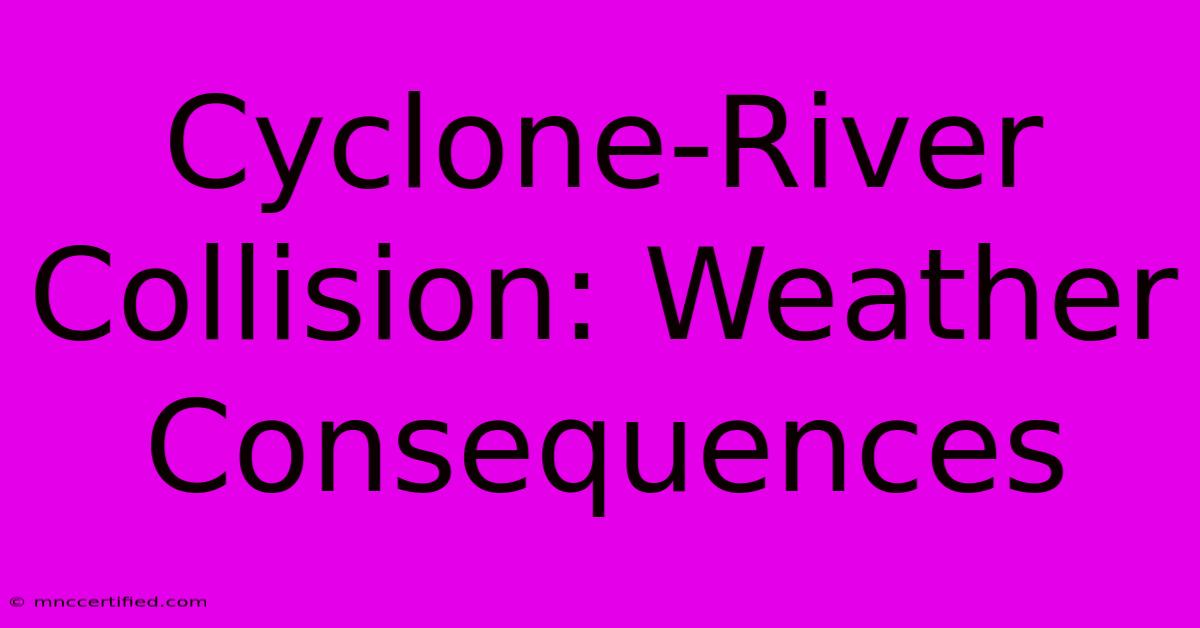Cyclone-River Collision: Weather Consequences

Table of Contents
Cyclone-River Collision: Weather Consequences – A Devastating Interaction
Cyclones, also known as hurricanes or typhoons depending on location, are powerful weather systems capable of immense destruction. When their path intersects with a major river system, the consequences can be amplified dramatically, leading to a complex and often devastating interplay of weather phenomena. This article explores the multifaceted weather consequences of a cyclone-river collision.
The Amplified Impact: How Rivers Exacerbate Cyclone Damage
The impact of a cyclone isn't solely defined by its wind speed and rainfall. The interaction with a river system introduces several critical factors that exacerbate the damage and increase the severity of the weather consequences:
1. Increased Flooding:
This is perhaps the most immediate and significant consequence. A cyclone's heavy rainfall already leads to significant flooding. However, when this coincides with a river system, the river's capacity to handle the increased water volume is quickly overwhelmed. This leads to:
- Riverine Flooding: The river bursts its banks, inundating vast areas of land adjacent to the river.
- Coastal Flooding: Storm surges driven by the cyclone can push seawater far inland, exacerbating river flooding and creating a combined saltwater and freshwater deluge.
- Prolonged Flooding: The sheer volume of water requires a significant amount of time to recede, leading to prolonged inundation and damage.
2. Enhanced Storm Surge:
Rivers act as funnels, concentrating the impact of the storm surge. The surge’s energy is channeled inland along the river's course, pushing the water further upstream than would otherwise be possible. This leads to increased flooding and damage in areas far from the coast.
3. Sedimentation and Water Pollution:
Cyclones can significantly alter river systems. The powerful winds and torrential rains erode riverbanks, leading to increased sedimentation in the water. This sediment can contaminate drinking water sources and damage ecosystems. Furthermore, pollutants from industrial sites, sewage systems, and agricultural runoff are often swept into the rivers, creating widespread water pollution.
4. Changes in River Flow and Course:
The immense force of a cyclone can dramatically alter a river's flow and even its course. The erosion of riverbanks can lead to the formation of new channels, while the deposition of sediment can create blockages and alter the river's path. These changes can have long-term ecological consequences.
Predicting and Mitigating the Risks
Predicting the exact consequences of a cyclone-river collision requires sophisticated weather modeling and a comprehensive understanding of the river system's hydrology. Effective mitigation strategies include:
- Improved Early Warning Systems: Providing timely warnings to communities at risk is crucial for effective evacuation and disaster preparedness.
- River Management and Flood Control: Investing in infrastructure such as levees, dams, and improved drainage systems can help mitigate the impact of flooding.
- Land Use Planning: Restricting development in flood-prone areas can minimize the risk to human life and property.
- Community Preparedness: Educating communities about cyclone preparedness and flood safety is crucial.
Conclusion: A Complex and Devastating Interaction
The intersection of a cyclone and a river creates a complex and potentially devastating weather event. Understanding the various ways in which these forces interact is critical for developing effective strategies to mitigate the risks and minimize the impact on communities and ecosystems. By investing in improved forecasting, infrastructure development, and community preparedness, we can better protect ourselves from the devastating consequences of cyclone-river collisions. Ongoing research and collaboration are vital in enhancing our understanding and response to this challenging meteorological phenomenon.

Thank you for visiting our website wich cover about Cyclone-River Collision: Weather Consequences. We hope the information provided has been useful to you. Feel free to contact us if you have any questions or need further assistance. See you next time and dont miss to bookmark.
Featured Posts
-
Believe Brooks And Dunn Jelly Roll
Nov 21, 2024
-
Gere Drops F Bomb On Today Show
Nov 21, 2024
-
Is Voquezna Covered By Insurance
Nov 21, 2024
-
Sustainability Penns Action Plan Focus
Nov 21, 2024
-
Stalker 2 Delay Reasons Behind The Push
Nov 21, 2024